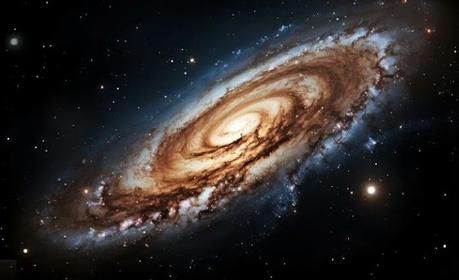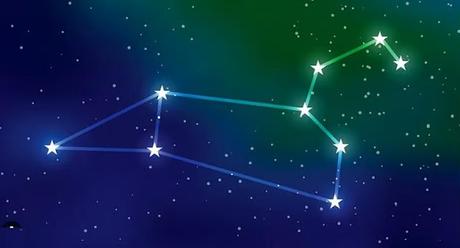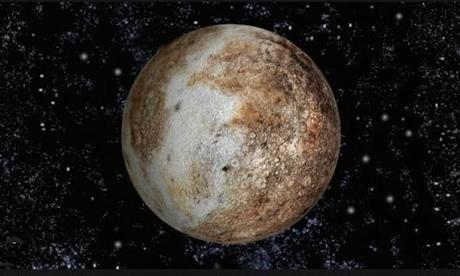each his own, the longer known the more alone,
wrapt in emphatic fire roaring out to a black flue.
Basil Bunting, 'Briggflatts'
When I was was a kid, somebody bought me The Observer's Book of Astronomy, one of many books written on the subject by the late Patrick Moore. I was intrigued by the pictures of constellations, although I must admit I spent more time looking at the book than into the night sky. More than once, I must've thought it would be interesting to be an astronomer, but I was lousy at maths and just don't have the sort of mind that's good at remembering long lists of names (I tried a few times to memorise the main features on the moon, but they never stuck).
Years later, when I moved to the Yorkshire Dales, I found myself living in an area free of light pollution. For most of my life, the sky had been no more than an orange haze. All of a sudden, there was so much to see.
I got hold of a star map (the Observer's Book had disappeared a long time ago) and actually managed to memorise a few constellations: Orion, Cassiopeia, Taurus, Cygnus, Auriga, Draco, Leo. It felt good, being able to recognize them, just as it did to know the names of the local hills. And it's not just the constellations: there's a lot of other things up there you can discover without a telescope, too. Peripheral vision is more sensitive to light than central vision. You may know this trick already, but if you don't, try looking just to one side of the second star in the handle of The Plough (look at it out of the corner of your eye, in other words) and you can see there are, in fact, two stars. A binary system. (In fact, there are four stars, but only two are visible to the naked eye). Talking of such things, Andromeda, I discovered, is a good constellation to know: the Andromeda Nebula (M31 pictured above) is the nearest major galaxy to our own and if you can recognize the constellation, it's easy to locate the nebula from it. If you know where to look on a very dark night, you can just make it out in the corner of your eye. Binoculars reveal it to be a mysterious-looking smudge. As for seeing our own, the Milky Way Galaxy, we're in it, of course, but as everybody knows, at the right time of year on a dark night you can see the distant, inner part of it as a long, silvery band stretched out across the sky. When it's really dark in the Dales, you can even make out the dust-clouds near it's center. It's like your standing on the outskirts of a forest, staring into its depths: the stars you see when you look up are the foreground, the individual trees that immediately surround you; the distant band of the Milky Way, the green-brown haze of the more distant trees that merge into a single mass. Of the constellations I learned to spot, one of the ones that most resembles the thing it's supposed to depict has to be Leo. For those who don't know it, the prominent group of stars known as the Sickle is clearly the lion's mane. Look behind it and all the other parts of the beast readily fall into place. Once seen, never forgotten.
Talking of such things, Andromeda, I discovered, is a good constellation to know: the Andromeda Nebula (M31 pictured above) is the nearest major galaxy to our own and if you can recognize the constellation, it's easy to locate the nebula from it. If you know where to look on a very dark night, you can just make it out in the corner of your eye. Binoculars reveal it to be a mysterious-looking smudge. As for seeing our own, the Milky Way Galaxy, we're in it, of course, but as everybody knows, at the right time of year on a dark night you can see the distant, inner part of it as a long, silvery band stretched out across the sky. When it's really dark in the Dales, you can even make out the dust-clouds near it's center. It's like your standing on the outskirts of a forest, staring into its depths: the stars you see when you look up are the foreground, the individual trees that immediately surround you; the distant band of the Milky Way, the green-brown haze of the more distant trees that merge into a single mass. Of the constellations I learned to spot, one of the ones that most resembles the thing it's supposed to depict has to be Leo. For those who don't know it, the prominent group of stars known as the Sickle is clearly the lion's mane. Look behind it and all the other parts of the beast readily fall into place. Once seen, never forgotten. The thing is, though, any intelligent species living on a planet orbiting the star Denebola would have no idea that their sun was, to us, a lion's back end, that the ancient Egyptians worshipped the constellation – which they called knem – or that the ancient Greeks associated it with the Nemean lion, a monster killed by Hercules. And it would never occur to them that superstitious Earthlings today think that if their sun is in the same part of the sky as our sun when someone is born, it makes that person ambitious and confident. I'm assuming here that this species has optical vision, not unlike our own, cultures, myths and languages we might recognize and are able to see the night sky much as we see it. These are big assumptions. They may, of course, have completely different ways of perceiving the presence of our star and ascribe it a significance we can't even begin to imagine. Nevertheless, it makes you wonder. It begs the question, if our sun is a visible star in the night sky of other intelligent species, what cultural significance, if any, do they attribute to our star? Are we, without knowing it, orbiting the body part of some mythological alien animal?We might, of course, be of significance to more than one civilization – and on more than one planet. I say 'be' but which tense we should use begins to get very complicated when we start contemplating these things. All that we do know, whichever planet we live on, is that star-light takes centuries to reach us and, whatever significance we might ascribe to each other's home-stars, all of our species probably exist for a mere blink of a cosmic eye. I say probably, because our lives are mere snapshots of evolution: we're still evolving. Who's to say what we're evolving into? And who's to say what other species elsewhere in the universe, perhaps millions of years ahead of us, have already become? As for the stars, though, as Basil Bunting put it:
The thing is, though, any intelligent species living on a planet orbiting the star Denebola would have no idea that their sun was, to us, a lion's back end, that the ancient Egyptians worshipped the constellation – which they called knem – or that the ancient Greeks associated it with the Nemean lion, a monster killed by Hercules. And it would never occur to them that superstitious Earthlings today think that if their sun is in the same part of the sky as our sun when someone is born, it makes that person ambitious and confident. I'm assuming here that this species has optical vision, not unlike our own, cultures, myths and languages we might recognize and are able to see the night sky much as we see it. These are big assumptions. They may, of course, have completely different ways of perceiving the presence of our star and ascribe it a significance we can't even begin to imagine. Nevertheless, it makes you wonder. It begs the question, if our sun is a visible star in the night sky of other intelligent species, what cultural significance, if any, do they attribute to our star? Are we, without knowing it, orbiting the body part of some mythological alien animal?We might, of course, be of significance to more than one civilization – and on more than one planet. I say 'be' but which tense we should use begins to get very complicated when we start contemplating these things. All that we do know, whichever planet we live on, is that star-light takes centuries to reach us and, whatever significance we might ascribe to each other's home-stars, all of our species probably exist for a mere blink of a cosmic eye. I say probably, because our lives are mere snapshots of evolution: we're still evolving. Who's to say what we're evolving into? And who's to say what other species elsewhere in the universe, perhaps millions of years ahead of us, have already become? As for the stars, though, as Basil Bunting put it:Then is Now. The star you steer by is gone,
its tremulous thread spun in the hurricane
spider floss on my cheek
Ibid.
I wrote this poem below a few years ago. It was first published in The Passionate Transitory magazine which, sadly, though passionate in its promotion of poetry, itself turned out to be transitory. I think, when I wrote it, Pluto was still a planet. Don't get me going on that.

News from Pluto
Something's about to happen. I'm not sure what.
I've watched for long enough and, yes, I get
Impatient, as the months slip by. And yet
This is important. In a way, I'm not.
Earth, erratic, crosses the ecliptic;
By day, the sun's scarce bigger than a star:
It makes you realize just how small we are.
Will I get home? I must be realistic.
Gravity's low. Perhaps my bones grow thin.
I jog the corridors, try to keep fit,
But face the fact (there's no escaping it)
I have become this waiting game I'm in.
One day, it'll happen, I've no doubt.
Exactly when, I don't know. I'll find out.
Dominic Rivron
Email ThisBlogThis!Share to TwitterShare to Facebook
